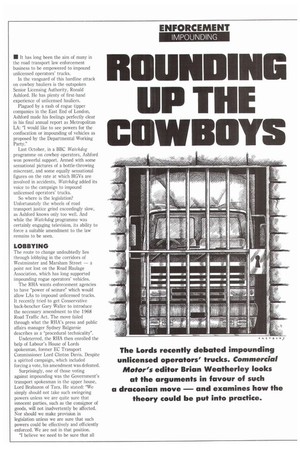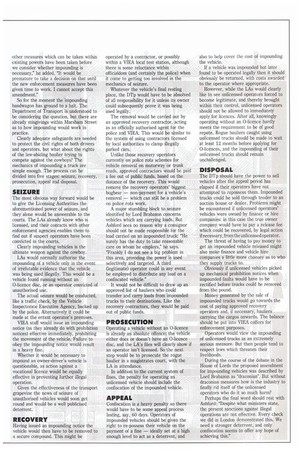ROUNDING
Page 30

Page 31

If you've noticed an error in this article please click here to report it so we can fix it.
P THE
Buys
• It has long been the aim of many in the road transport law enforcement business to be empowered to impound unlicensed operators' trucks.
In the vanguard of this hardline attack on cowboy hauliers is the outspoken Senior Licensing Authority, Ronald Ashford. He has plenty of first-hand experience of unlicensed hauliers.
Plagued by a rash of rogue tipper companies in the East End of London, Ashford made his feelings perfectly clear in his final annual report as Metropolitan LA: "I would like to see powers for the confiscation or impounding of vehicles as proposed by the Departmental Working Party."
Last October, in a BBC Watchdog programme on cowboy operators, Ashford won powerful support. Armed with some sensational pictures of a bottle-throwing miscreant, and some equally sensational figures on the rate at which HGVs are involved in accidents, Watchdog added its voice to the campaign to impound unlicensed operators' trucks.
So where is the legislation? Unfortunately the wheels of road transport justice grind exceedingly slow, as Ashford knows only too well. And while the Watchdog programme was certainly engaging television, its ability to force a suitable amendment to the law remains to be seen.
LOBBYING
The route to change undoubtedly lies through lobbying in the corridors of Westminster and Marsham Street — a point not lost on the Road Haulage Association, which has long supported impounding rogue operators' vehicles.
The RHA wants enforcement agencies to have "power of seizure" which would allow LAs to impound unlicensed trucks. It recently tried to get Conservative back-bencher Gary Waller to introduce the necessary amendment to the 1968 Road Traffic Act. The move failed through what the RHA's press and public affairs manager Sydney Balgarnie describes as a "procedural technicality".
Undeterred, the RHA then enrolled the help of Labour's House of Lords spokesman, former EC Transport Commissioner Lord Clinton Davis. Despite a spirited campaign, which included forcing a vote, his amendment was defeated.
Surprisingly, one of those voting against impounding was the Government's transport spokesman in the upper house, Lord Brabazon of Tara. He stated: "We simply should not take such swingeing powers unless we are quite sure that innocent parties, such as the consignor of goods, will not inadvertently be affected. Nor should we make provision in legislation unless we are sure that such powers could be effectively and efficiently enforced. We are not in that position.
"I believe we need to be sure that all other measures which can be taken within existing powers have been taken before we consider whether impounding is necessary," he added. 'It would be premature to take a decision on that until the new enforcement measures have been given time to work. I cannot accept this amendment."
So for the moment the impounding bandwagon has ground to a halt. The Department of Transport is understood to be considering the question, but there are already misgivings within Marsham Street as to how impounding would work in practice.
Clearly adequate safeguards are needed to protect the civil rights of both drivers and operators, but what about the rights of the law-abiding haulier trying to compete against the cowboys? The mechanics of impounding a truck are simple enough. The process can be divided into five stages: seizure, recovery, prosecution, appeal and disposal,
SEIZURE
The most obvious way forward would be to give the Licensing Authorities the aforementioned power of seizure, and they alone would be answerable to the courts. The LAs already know who is licensed, and their contacts with other enforcement agencies enables them to find out if suspect operators have been convicted in the courts.
Clearly impounding vehicles is the ultimate weapon against the cowboy.
LAs would normally authorise the impounding of a vehicle only in the event of irrefutable evidence that the vehicle was being used illegally. This would be a vehicle found running without an 0-licence disc, or an operator convicted of unauthorised use.
The actual seizure would be conducted, like a traffic check, by the Vehicle Inspectorate Executive Agency, backed up by the police. Alternatively it could be made at the errant operator's premises.
VIEA staff would issue an impounding notice (as they already do with prohibition notices) effective immediately, prohibiting the movement of the vehicle. Failure to obey the impounding notice would result in a heavy fine.
Whether it would be necessary to impound an owner-driver's vehicle is questionable, as action against a vocational licence would be equally effective in preventing further illegal operation.
Given the effectiveness of the transport grapevine the news of seizure of unauthorised vehicles would soon get round and would be a well publicised deterrent.
RECOVERY
Having issued an impounding notice the vehicle would then have to be removed to a secure compciund. This might he operated by a contractor, or possibly within a VIEA local test station, although there is some reluctance within officialdom (and certainly the police) when it come to getting too involved in the mechanics of seizure.
Whatever the vehicle's final resting place, the DTp would have to be absolved of all responsibility for it unless its owner could subsequently prove it was being used legally.
The removal would be carried out by an approved recovery contractor, acting as an officially authorised agent for the police and VIEA, This would be similar to the system of using contractors licensed by local authorities to clamp illegally parked cars.
Unlike those recovery operators currently on police rota schemes for vehicle removal on motorway or trunk roads, approved contractors would be paid a fee out of public funds, based on the distance of the recovery. T his would remove the recovery operators' biggest bugbear — non-payment for a vehicle's removal — which can still be a problem on police rota work.
A major stumbling block to seizure identified by Lord Brabazon concerns vehicles which are carrying loads. But Ashford sees no reason why a consignor should not be made responsible for the load carried on an impounded truck: He surely has the duty to take reasonable care on whom he employs," he says. "Frankly I do not see a big problem in this area, providing the power is used selectively and targeted. A third (legitimate) operator could in any event be employed to distribute any toad on a confiscated vehicle."
It would not be difficult to draw up an approved list of hauliers who could transfer and carry loads from impounded trucks to their destinations. Like the recovery contractors, they would be paid out of public funds.
PROSECUTION
Operating a vehicle without an 0-licence is already an absolute offence: the vehicle either does or doesn't have an 0-licence disc, and the LA's files will clearly show if an operator isn't licensed. So the next step would be to prosecute the rogue haulier in a magistrates court, with the LA in attendance.
In addition to the current system of fines, the penalty for operating an unlicensed vehicle should include the confiscation of the impounded vehicle.
APPEAL
Confiscation is a heavy penalty so there would have to be some appeal process lasting, say, 60 days. Operators of impounded vehicles should be given the right to re-possess their vehicle on the payment of a fine — ideally set at a high enough level to act as a deterrent, and also to help cover the cost of impounding the vehicle.
If a vehicle was impounded but later found to be operated legally then it should obviously be returned, with costs awarded to the operator where appropriate.
However, while the LAs would clearly like to see unlicensed operators forced to become legitimate, and thereby brought within their control, unlicensed operators should not be allowed to immediately apply for licences. After all, knowingly operating without an 0-licence hardly meets the requirement to be of good repute. Rogue hauliers caught using unlicensed trucks should be made to wait at least 12 months before applying for 0-licences, and the impounding of their unlicensed trucks should remain unchallenged.
DISPOSAL
The DTp should have the power to sell vehicles after the appeal period has elapsed if their operators have not attempted to repossess them. Impounded trucks could be sold through tender to an auction house or dealer. Problems might be encountered if unlicensed operators' vehicles were owned by finance or hire companies: in this case the true owner company would have to pay a release fee which could be recovered, by legal action if necessary, from the unlicensed operator.
The threat of having to pay money to get an impounded vehicle released might also make finance and vehicle hire companies a little more choosey as to who they supply trucks to.
Obviously if unlicensed vehicles picked up mechanical prohibition notices when impounded faults would have to be rectified before trucks could be removed from the pound.
Money generated by the sale of impounded trucks would go towards the cost of paying approved recovery operators and, if necessary, hauliers carrying the cargos onwards. The balance should be put into VIEA coffers for enforcement purposes.
Operators would view the impounding of unlicensed trucks as an extremely serious measure. But then people tend to respect laws which threaten their livelihoods.
During the course of the debate in the House of Lords the proposed amendment for impounding vehicles was described by Lord Brabazon as "draconian". But without draconian measures how is the industry to finally rid itself of the unlicensed operators who do it so much harm?
Perhaps the final word should rest with Ashford: "Despite what ministers state, the present sanctions against illegal operations are not effective. Every check we did in London demonstrated this. We need a stronger deterrent, and only confiscation seems to offer any hope of achieving this."












































































